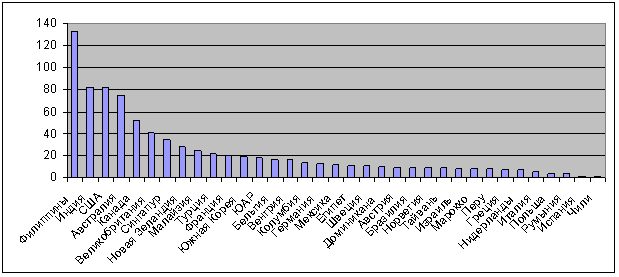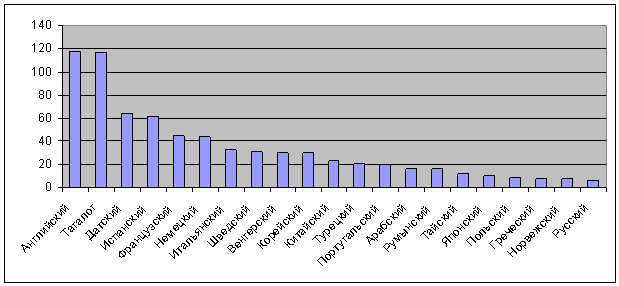Philippine Phenomenon
Not long ago I had to write an essay affecting the education system in the information society .
And I wondered: in which country information technologies are most intensively used for educational purposes? The experience of such a country could be transferred to other countries, including Russia.
To answer this question, I decided to use Google Trends . I tried to enter search queries that people can do only for the purpose of self-education, and then I looked at the residents of which country made the most such requests. Of course, this method has its drawbacks, but Google, firstly, equates requests made in different languages, and secondly, it has the largest territorial coverage of all.
')
Having made dozens of such requests, I received a completely unexpected result. The Philippines has become the absolute and undisputed leader in such requests. Not Finland, not America, not India, but the Philippines - a country that does not demonstrate a particular economic miracle, does not occupy first place in educational ratings, is not particularly rich in IT infrastructure, and does not implement any special educational policy.
Let's look at the statistics on the basis of which conclusions can be drawn about the existence of an educational anomaly.
Here is the distribution of the number of requests by country:

But the distribution by language:

Both territorially and linguistically, the Philippines (and, accordingly, Tagalog) is leading in terms of the number of educational search queries. Yes, English is in the first place in the linguistic distribution, but, firstly, it is the second official language of the Philippines, and secondly, it cannot represent any particular country, due to the large number of English-speaking countries.
Now a little about the methodology and the requests themselves. I tried to make such requests that would meet the following requirements:
What is the reason? I tried to analyze a variety of parameters that could affect this statistic:
Maybe the education system of the Philippines is so bad that Filipinos are simply forced to get their knowledge from the Internet? I do not have an answer to this question. Maybe, you know?
And I wondered: in which country information technologies are most intensively used for educational purposes? The experience of such a country could be transferred to other countries, including Russia.
To answer this question, I decided to use Google Trends . I tried to enter search queries that people can do only for the purpose of self-education, and then I looked at the residents of which country made the most such requests. Of course, this method has its drawbacks, but Google, firstly, equates requests made in different languages, and secondly, it has the largest territorial coverage of all.
')
Having made dozens of such requests, I received a completely unexpected result. The Philippines has become the absolute and undisputed leader in such requests. Not Finland, not America, not India, but the Philippines - a country that does not demonstrate a particular economic miracle, does not occupy first place in educational ratings, is not particularly rich in IT infrastructure, and does not implement any special educational policy.
Let's look at the statistics on the basis of which conclusions can be drawn about the existence of an educational anomaly.
Here is the distribution of the number of requests by country:

But the distribution by language:

Both territorially and linguistically, the Philippines (and, accordingly, Tagalog) is leading in terms of the number of educational search queries. Yes, English is in the first place in the linguistic distribution, but, firstly, it is the second official language of the Philippines, and secondly, it cannot represent any particular country, due to the large number of English-speaking countries.
Now a little about the methodology and the requests themselves. I tried to make such requests that would meet the following requirements:
- Requests should have a clear relationship to education, and at the same time not be related to other areas of human life. For example, the query “Pascal” could characterize a person’s desire to learn about a great scientist, but this query is not suitable due to the great popularity of the programming language of the same name. As a criterion, a search query was entered into Google and the first 10 most popular results were analyzed. If they contained information that was not related to the object in question, then such a request was rejected or corrected.
- Requests should relate to the most basic, common knowledge, not beyond the limits of secondary education and relevant to any country.
- Requests should relate to a variety of disciplines, both natural science and humanities: mathematics, physics, chemistry, biology, history, philosophy, literature.
- Requests should be formulated as simply as possible to maximize the likelihood of unambiguous translation into all the languages of the world.
- democritus
- julius caesar
- amenhotep
- saturn ring
- solar system
- oxidation
- colloid
- hydrogene
- trigonometric formulas
- multiplication table
- blaise pascal
- darwin theory
- human anatomy
- william shakespeare
- tolstoy
What is the reason? I tried to analyze a variety of parameters that could affect this statistic:
- share of Internet users in the total population
- average width of the Internet channel
- number of computers per 100 people
- education index
- literacy index
- standard of living
- Hdi
- GDP per capita
Maybe the education system of the Philippines is so bad that Filipinos are simply forced to get their knowledge from the Internet? I do not have an answer to this question. Maybe, you know?
Source: https://habr.com/ru/post/103538/
All Articles